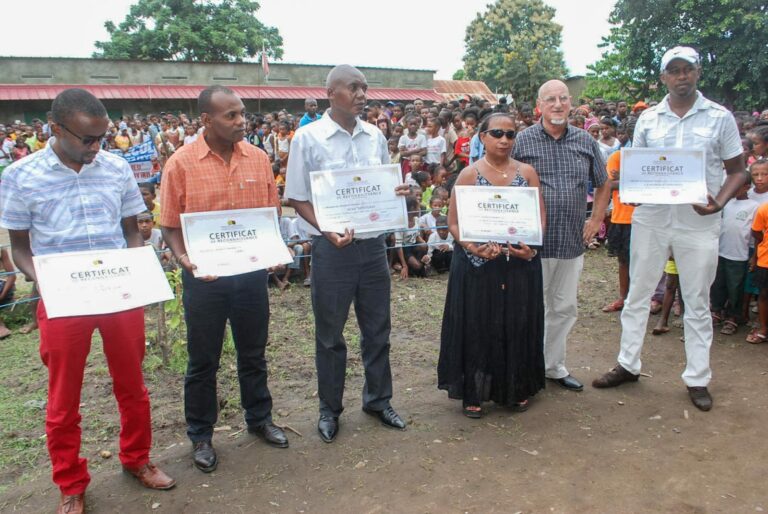Madagascar’s Ministry of National Education awarded Blue Ventures a “Certificat de Reconnaisse”, acknowledging the contribution of our thriving environmental education programme to the Ambanja region in the island’s northwest. Our Environmental Education Officer Alban Aoemba (third from left, above) proudly received the certificate during Ambanja’s “School Day” celebrations, part of an annual event that occurs across Madagascar.
Blue Ventures’ environmental education programme in northwest Madagascar – funded by the European Outdoor Conservation Association – was launched just six months ago, and aims to teach children at 12 primary schools about the importance of protecting mangrove forests in the face of climate change.
Mangrove trees are the main focus of this programme due to their immense value, both to coastal communities and the environment. As well as harbouring unique biodiversity, mangroves support important fisheries upon which millions of people depend, whilst shielding coastal communities from sea level rise and storms. These forests also store huge amounts of carbon in their biomass and sediments, helping to combat global climate change. However, the island’s mangroves are disappearing at an alarming rate. This is due to a number of factors including logging for charcoal production for sale on local markets.
Our education programme forms part of our integrated blue forests initiative, and is founded on an established conservation approach whereby a voluntary agreement is made between a community and an NGO. The community members commit to certain conservation or monitoring activities in exchange for material support, capacity building and/or the development of alternative livelihoods, depending on the communities’ needs.
Within our current programme, each of our 12 partner villages has agreed to reforest five hectares of mangroves in exchange for teaching materials, training and lesson guides that enable school staff to teach engagingly about environmental issues.
This approach fosters collaboration between community members to achieve the goal of reforesting their five hectares. If one person was to deforest these mangroves, the whole village would feel the repercussions of losing the school materials and training. As part of the agreement, the community understands that if it does not fulfil the terms of the agreement, the support will ultimately be withdrawn.
The programme’s first year has been highly successful, with over 200,000 mangroves being planted across a 55 hectare area previously deforested for charcoal production. At one event, 114 children from a primary school in Andrahibo village planted 4,824 mangrove trees with help from their teachers and the Blue Ventures team. Receiving ministerial recognition for our progress with this approach has given our team even greater motivation as they continue to work with mangrove-dependent communities to achieve their conservation goals.
Long-term changes in environmental awareness must start with improved education for children, as they will be the next generation of fishers, mangrove users and community leaders. The management of Madagascar’s natural resources will one day rest in the hands of this new generation, so our environmental education team is working hard to reach out to as many students as possible to ensure that future management is equitable and sustainable. In the coming weeks, the team will roll out its newly designed curriculum about mangroves and climate change – the first of its kind in the northwest region – for use in our partner villages’ schools to explain the rationale behind reforesting mangroves and inspire children to respect and care for their environment.
Contact: Zo Andriamahenina, Association Support Coordinator
Find out more about our work building community capacity for sustainable mangrove management























